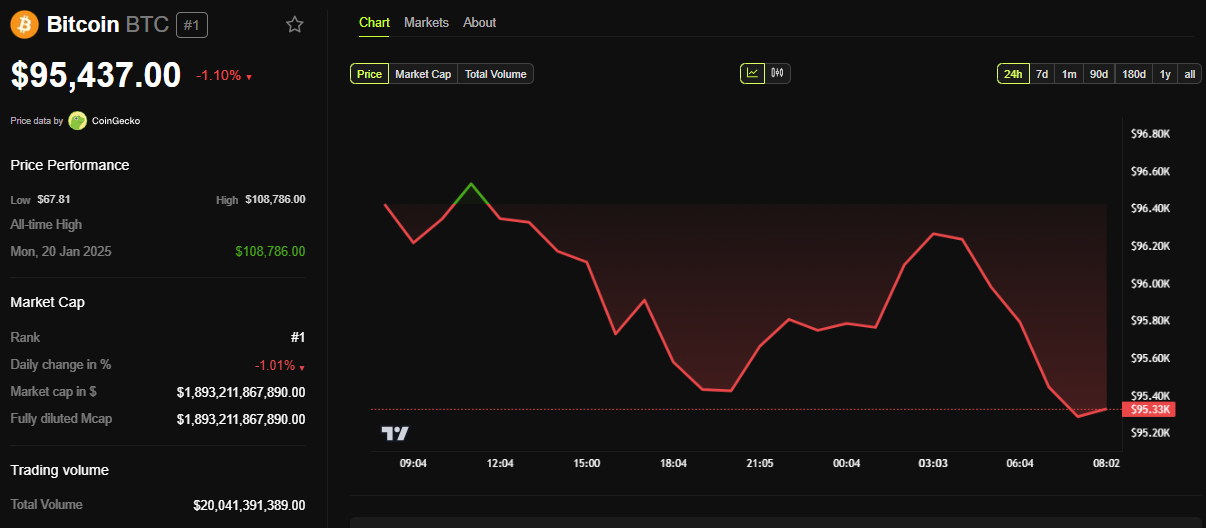The cryptocurrency market should closely monitor several key U.S. economic data this week, considering the macroeconomic events surrounding Bitcoin (BTC).
Bitcoin is trading in the range of $95,000, and this week's economic events may trigger the next directional move.
Consumer Confidence
The University of Michigan is scheduled to report on U.S. consumer confidence on Tuesday. This provides information on buyer attitudes, purchase intentions, vacation plans, inflation expectations, stock prices, and interest rates.
The previous consumer confidence index was 104.1, and the consensus is for a slight decline to 102.4. This sentiment is reflected in former President Donald Trump's policies, and Ark Invest's Cathie Wood has mentioned the impact of the new administration's spending.
"Today, nearly a third of the workforce and perhaps their families may be holding back on spending until they see the impact of the dramatic policy changes. We believe the changes will be net positive for the economy, but the short-term uncertainty is palpable." – Cathie Wood, CEO of Ark Invest
Specifically, consumer confidence data does not move the cryptocurrency market like Federal Reserve (Fed) rate hikes. However, it signals how people feel about discretionary spending and investment. Cryptocurrencies, especially Bitcoin, are primarily retail-driven markets, so they are sensitive to this sentiment.
Initial Jobless Claims
The Thursday report on initial jobless claims is another key U.S. economic data to watch this week. It measures the number of people filing for unemployment benefits for the first time in a week, providing a real-time pulse on the labor market and the broader economy.
Therefore, the impact of this report relates to how the data affects investor sentiment. An unexpected increase in jobless claims could signal economic weakness, indicating the risk of layoffs, growth slowdown, or recession.
Investors often interpret this as a signal to reduce risk, moving funds from volatile assets like Bitcoin and cryptocurrencies to safer investments like cash or bonds. Conversely, if initial jobless claims decrease or come in lower than expected, it indicates strength in the labor market.
This can boost confidence, encouraging investors to allocate to risk assets, including cryptocurrencies. A robust employment situation can also alleviate fears of aggressive rate hikes, potentially giving Bitcoin room to rise if it maintains its appeal as digital gold.
According to data from MarketWatch, after the previous 219,000 initial jobless claims, economists expect an increase to 225,000 for the week ending February 22.
U.S. Gross Domestic Product (GDP)
The U.S. GDP report scheduled for release this Thursday can also significantly impact the Bitcoin and cryptocurrency markets. Like consumer confidence and initial jobless claims, this data can shape investor perceptions of economic health and the direction of monetary policy.
Stronger-than-expected GDP figures could signal robust economic growth, potentially reducing Bitcoin's appeal as a hedge against uncertainty, as investors may gravitate towards traditional assets like stocks in anticipation of the Federal Reserve's tightening policies to curb inflation.
This risk-off shift could exert downward pressure on cryptocurrency prices, as the recent correlation between Bitcoin and stocks has strengthened. For example, if GDP growth exceeds forecasts (above the 2.3% expected for Q4 2024), it could weaken hopes for rate cuts.
Conversely, a weaker-than-expected GDP report could fuel a cryptocurrency rally. A significant slowdown in growth, with a lower rate than the previous quarter, could raise recession concerns and prompt the Fed to take a more dovish stance, increasing the likelihood of rate cuts.
This scenario could enhance Bitcoin's appeal as a digital gold or alternative store of value, particularly if investors lose faith in the stability of fiat currencies amid economic malaise.
U.S. Personal Consumption Expenditures (PCE)
Another key U.S. economic data to watch this week is the January Personal Consumption Expenditures (PCE) report, scheduled for release on Friday. This is the Federal Reserve's preferred inflation gauge, providing a fresh read on how price pressures are evolving, which can shake up expectations for interest rates and risk assets like cryptocurrencies.
If PCE comes in higher than expected, exceeding the monthly growth rate of 0.3% for the headline index or 0.2% for the core index, it could signal stubborn inflation. This could reduce the near-term likelihood of rate cuts and surprise investors, potentially causing Bitcoin to decline as funds shift from speculative investments to safer havens.
Conversely, a lower-than-expected PCE, close to or below the Fed's 2% annual target, could trigger a rally.
"The 2% inflation target was first introduced by the Fed in 2012, when core PCE was 1.8%. This was a pretext for justifying quantitative easing. For the Fed's first 99 years, the unofficial target was zero, and its mandate was price stability." – Bitcoin critic Peter Schiff
Lower inflation could raise hopes that the Fed will ease rates more quickly, potentially as soon as the March 19 meeting. This could make cheaper capital more available and increase demand for cryptocurrencies.
Bitcoin has been sensitive to these macroeconomic signals, including its recent reaction to former President Trump's tariffs. Nonetheless, investors should be prepared for volatility as cryptocurrencies tend to respond to these releases.
"This week's PCE could be a bigger market mover than NVDA. Embrace the volatility," a user observed on X.

According to BeInCrypto data, Bitcoin is trading at $95,437 at the time of writing, down 1.1% since the start of the Monday session.







